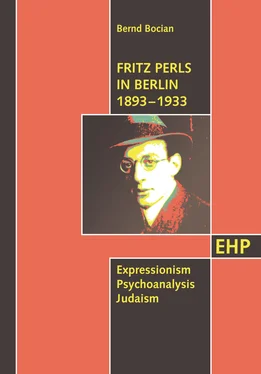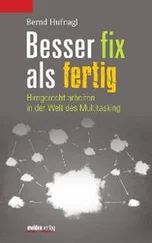Bernd Bocian - Fritz Perls in Berlin 1893 - 1933
Здесь есть возможность читать онлайн «Bernd Bocian - Fritz Perls in Berlin 1893 - 1933» — ознакомительный отрывок электронной книги совершенно бесплатно, а после прочтения отрывка купить полную версию. В некоторых случаях можно слушать аудио, скачать через торрент в формате fb2 и присутствует краткое содержание. Жанр: unrecognised, на английском языке. Описание произведения, (предисловие) а так же отзывы посетителей доступны на портале библиотеки ЛибКат.
- Название:Fritz Perls in Berlin 1893 - 1933
- Автор:
- Жанр:
- Год:неизвестен
- ISBN:нет данных
- Рейтинг книги:3 / 5. Голосов: 1
-
Избранное:Добавить в избранное
- Отзывы:
-
Ваша оценка:
- 60
- 1
- 2
- 3
- 4
- 5
Fritz Perls in Berlin 1893 - 1933: краткое содержание, описание и аннотация
Предлагаем к чтению аннотацию, описание, краткое содержание или предисловие (зависит от того, что написал сам автор книги «Fritz Perls in Berlin 1893 - 1933»). Если вы не нашли необходимую информацию о книге — напишите в комментариях, мы постараемся отыскать её.
Fritz Perls in Berlin 1893 - 1933 — читать онлайн ознакомительный отрывок
Ниже представлен текст книги, разбитый по страницам. Система сохранения места последней прочитанной страницы, позволяет с удобством читать онлайн бесплатно книгу «Fritz Perls in Berlin 1893 - 1933», без необходимости каждый раз заново искать на чём Вы остановились. Поставьте закладку, и сможете в любой момент перейти на страницу, на которой закончили чтение.
Интервал:
Закладка:
The concept of contact, which is so central to Gestalt therapy, has one of its sources here. Within the context of the childhood memories mentioned above, Perls defined a relationship structure as a confluence when the child is »good« in a manner that corresponds to the will of its parents, as opposed to the isolation of the child when its behavior does not match its parents’ expectations, and they then experience and define it as »bad.« In Perls’s view, no contact existed between the people involved in either confluence or isolation, »for contact is the appreciation of differences« (ibid., 261).
Perls had this painful, formative father conflict in common with Karen Horney as well, one of the other psychoanalytic dissidents. Horney became his first training analyst, and later his control analyst. They enjoyed a good personal relationship, and Horney’s revisions of Freud later inspired Perls and showed many parallels to revisions of his own (see Bocian 1992). Horney was plagued by her strict Christian father and entered in her diary at age fourteen: »It must be marvelous to have a father one can love and respect. The Fourth Commandment with its »Thou shalt« looms before me like a ghost. I cannot honor a person who makes all of us unhappy with his hypocrisy, egotism, crudeness, and poor manners« (in Stephan 1992, 236).
The early experience of a repressive »Thou shalt,« which was classified within the system of Freudian theory as the »super-ego« and which Perls called an unacceptable introjection, 25played a significant role in the theory formation of virtually all Berlin character analysts.
3.4 Experiences in School.
The Subservient Mentality and Unsuccessful Triangulation
3.4.1 The Winners in Modernization.
Concerning the Level of Jewish Education
It is understandable that Perls’s parents were disappointed at his failure in school. For German Jews, assimilation into German society occurred through the acquisition of wealth and above all through education. The speed at which the rise »of emancipated Jewry progressed was also a result of Jewish family tradition. No Jewish mother would permit her children, especially her sons, to remain below their talent potential« (Amery in Engelmann 1998, 349). Thus, Perls was sent to a Gymnasium (I assume that he was the only one of the three children to attend) and the fact that he was later pointed in the direction of law or medicine in a sense reflected the standards of education-oriented German-Jewish families at the time.
As the German Empire was modernized, the prerequisites for social advancement had changed. Feudal restrictions had been eliminated almost entirely, and the privileged access to social advancement of previous times had been replaced through opportunity for individual advancement. These new, individually based opportunities were particularly beneficial to social classes that had been barred entrance to the higher professions. This group also included emancipated Jews. Discrimination continued with respect to civil service positions. As a rule, a military career was out of the question for Jews, and there were major restrictions in the areas of government administration, the legal system, and university positions; these also remained in effect if the individual converted to Christianity. In other areas of society, it was primarily a question of the capabilities a person had acquired, educational credentials, entrepreneurial spirit, and the like.
In his book on the social history of Jews in Europe, Karady writes that because of their exclusion from the feudal economy Jews formed a kind of »proto-bourgeois class« (Karady 1999, 16). When the feudal economic system was dismantled, the constraints of exclusion were transformed into qualifications that led to advancement success. Due to the restrictions society had placed on their fields of endeavor, Jews had acquired long experience in commerce and finance. Beyond the boundary of the society of estates, certain abilities and virtues had been cultivated that now carried weight because the focus had shifted to the individual himself. For Karady, they include perseverance, discipline, physical austerity, having a work ethic, a readiness to utilize opportunity, knowledge of the markets, and international connections. Furthermore, Jews were willing to invest in professions that members of the estate system did not consider appropriate to their social status, for example, medicine or pharmacy. Add to this a certain intellectualism stemming from the traditionally high value placed on studying books and on the interpretation and discussion of the Holy Scriptures. As a result, »the Jews of pre-modern Europe were the only religious group where adult male members were, so to speak, literate and at the same time bi- or multilingual« (ibid., 120). They studied religious scripture and the commentaries in Hebrew and Yiddish and usually also acquired the language of the country where they resided. Due to the weapons ban for Jewish communities and their high esteem for scholarship and education (which was assuredly also related to the weapons ban) the traditional hero was not a warrior but rather the scripture scholar. 26Over the centuries, Jews who had been scattered in the diaspora were held together as a specific community by the so-called Old Testament, in other words, by a book. This resulted in the development of correspondingly different masculine ideals in comparison to their Christian surroundings. The exercise of force was not held in high regard, and in Europe, where excessive drinking was viewed as a confirmation of masculinity, alcoholism in Jewish communities was extremely low. During the last decade of the 19 thcentury, university students who were from assimilated Jewish families and belonged to student associations (generally their own) were still having difficulties with the traditionally mandatory amounts of alcohol that were consumed in Christian fraternities.
The intellectualism engendered by the study of the religious scriptures and the culture of discussion and interpretation represented a type of cultural capital that was handed down through tradition within the congregations as well as by individual families in secularized form. This was rapidly turned to good account over the course of Jewish emancipation and the modernization of society. In other words, it was not a question of a genetic advantage, say, that Jews are naturally cleverer, but involved the effects of a specific cultural socialization and the stimulation of abilities that were important in the modern, post-feudal era.
In addition to a focus on commercial professions, the proportion of Jews in independent professions was high in relation to their percentage of the population overall. This applied in both Western and Eastern Europe to professions such as doctors, lawyers, engineers, architects, musicians, actors, writers, journalists, scientists, and private scholars. Karady reports, for example, that 75 percent of Viennese doctors were of Jewish origin in 1936, as were 62 percent of the lawyers, while their percentage of the total population was eight percent (see Karady 1999, 135).
One key prerequisite for the exceptional achievements of German Jews during the days of the German Empire and the Weimar Republic was their above-average educational level. Karady refers to this level as:
the technical prerequisite of the enormous intellectual energies for which assimilation served as a sociological framework. If this aboveaverage training level had not been present, the cultural capital could not have accumulated and engendered the exceptional achievements. Had there been no assimilation, the cultural activities of the Jews would have remained within the traditional Jewish framework. (ibid., 140).
The high educational level was also apparent in the statistical overrepresentation of Jews in the secondary schools and universities. Amery cites German statistics from shortly before 1914 that break down attendance at institutions of higher education by religious denomination. »A quota was established according to the actual percentage of the total population« (in Engelmann 1998, 350). The Protestants met their quota almost exactly, the Catholics fell short by 15 percent, and those of the Mosaic faith exceeded their quota by roughly 600 percent (see ibid.). In the year Perls was born, the Mosaic faith represented five percent of the overall population while accounting for almost 25 percent of students in higher secondary schools. In higher secondary schools for girls the percentage was about one third (see Rürup 1995, 157). Their final grades at higher secondary schools and universities were also above average. In Berlin, where the majority of Jewish families had assimilated themselves into the middle-class, the cost associated with attending secondary schools and universities did not as a rule pose an obstacle. Which is not to say that all Jewish families were rich. Yet the process of entering the middle-class was well nigh completed for German Jews; almost none of them were impoverished any more. As an example, in the year 1895 the percentage of Jews employed as peddlers in Prussia dropped to two percent, while 57 percent were working in independent, predominantly commercial vocations. In middle/lower-middle class families where regular earnings did not suffice to cover the costs, money for the education of the children was set aside. One social advantage was also that the birthrate had dropped significantly earlier in Jewish families than in Christian ones. Among Jews in Berlin, the number of children per family was between one and two. This corresponded to the idea of a middle-class nuclear family that generally provided good training and education for all of its children. With its three children, the Perls family was on par with Christian families. When savings within the family or measures to obtain the money to finance an education did not suffice, rich private benefactors often stepped in as did aid associations sponsored by the Jewish congregation, providing assistance in particular to many needy Jewish university students (see Rürup 1995, 161).
Читать дальшеИнтервал:
Закладка:
Похожие книги на «Fritz Perls in Berlin 1893 - 1933»
Представляем Вашему вниманию похожие книги на «Fritz Perls in Berlin 1893 - 1933» списком для выбора. Мы отобрали схожую по названию и смыслу литературу в надежде предоставить читателям больше вариантов отыскать новые, интересные, ещё непрочитанные произведения.
Обсуждение, отзывы о книге «Fritz Perls in Berlin 1893 - 1933» и просто собственные мнения читателей. Оставьте ваши комментарии, напишите, что Вы думаете о произведении, его смысле или главных героях. Укажите что конкретно понравилось, а что нет, и почему Вы так считаете.











